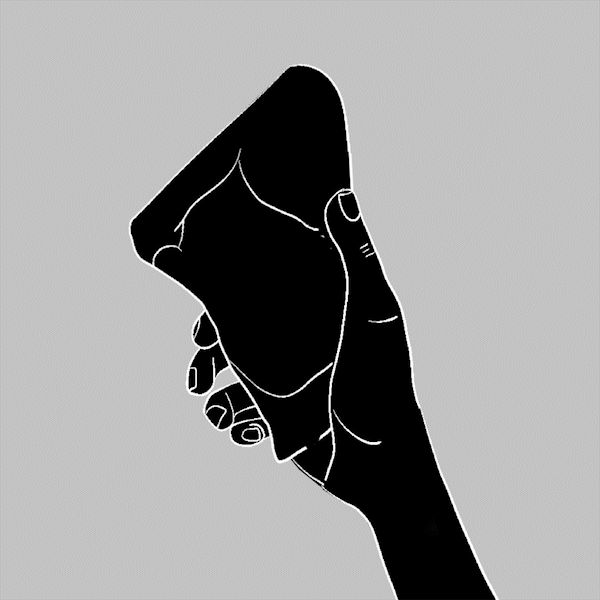BEAUTY DOESN’T COME IN A BOTTLE
Scrolling through our social media feels like a harmless part of our daily lives and as social media continues to become part of this fabricated modern life, abstinence is becoming less of an option.

Illustation: Argjira Kukaj
It`s a well-known fact that social media today has set unrealistic standards when it comes to `what is takes to be comfortable in your own body`.
According to a study made by Dr. Lillian Nejad both “men and women are most vulnerable to mental health problems during adolescence and young adulthood” seeing as society as a whole has embraced the use of social media into the routine of their daily lives, but we are only now learning about the impact it can have on a young person who has been exposed to social media.
Young people globally may buy into the idealized lives and notions of beauty that are portrayed on social media platforms. Social media “influencers” may be pushing the stereotypical social standards and therefore leading others into pressuring their own lives or even face. It has damaging effects of lacking self-love and acceptance.
It leads to constant comparisons to others who are deemed desirable and seem to have it all, as well as even participation in this false view of their own life for the sole purpose of being liked and accepted by others, friends and even strangers.
An experience I’ve had, as an artist, is that whenever I’ve found myself drawing faces or bodies, I made it into what an “ideal” one would seem, a ski slope nose, big eyes with long eyelashes, fuller lips, a face with a perfect structure and flawless skin and a curvy figure… That isn’t realistic. And for some reason all the faces I drew didn’t make sense to me. Even though they were drawn from following these standards for beauty that were set, they never looked realistic. That was until I decided that I should try drawing insecurities instead of perfections. All of the sudden a nose bump fixed it, wrinkles, acne scars and a little lopsided smile made it look so real, stretch marks looked beautiful and a little belly pouch was all it took.
Nobody is supposed to look a certain way. It’s the fact that we look differently that makes us stand out. That said, social media images and messages may be harmful for some who are less comfortable with their appearance, shape, or identity.
This universal beauty standard goes way back, and just when you think the world is over it, old habits come right back, picking at your flaws crawls its way back into every time you come across a mirror. It isn’t surprising for a person to feel like they have an unhealthy relationship with their body or face, or that they might not want to be living in that same skin with those intrusive thoughts. But what is surprising is how social media has completely taken advantage of that and instead of teaching and advertising to their daily users how to form that relationship into a healthy one, it has brainwashed the younger crowd into beauty standards that are somewhat unreachable for something so fragile such as is each and everyone’s body.
What is also surprising and a completely forgotten fact is how Capitalism affects these beauty standards or…how it sets them.
Yes, “Capitalism”- a system where production is based on profit as opposed to meeting basic human needs. Or a system that uses marketing to make up various “problems” and in return offer a perfect “solution”, for sale. And unfortunately ignoring this has become way too difficult when coming across TV and web commercials, articles, or even the unavoidable billboards across cities that offer the “golden ticket” to clear skin, beautiful hair, “desirable” smell. Eugene Schueller, who is the founder of L’Oréal, even summed up his marketing approach, when introducing the brand’s new shampoo in 1938, as he said: “Tell people they’re disgusting, they don’t smell good, and they’re not attractive. Just, you know, subtly.”
And that pretty much sums it up. When you unconsciously are picking up these comments about yourself that are “totally not directed at you”, you’ll want to change or “glow up”. That’s when the capitalistic effects will start to show visible. It starts with a face moisturizer, a harmless lip balm which subtly enhances your lips, a mascara that supposedly makes your lashes longer to wanting to smell good and different every time you go outside, to just a shirt that enhances your figure. To now, buying the new moisturizer everyone is talking about, to a lip-plumping lip balm, to the ‘Trendiest’ mascara which grows your lashes ”10x more than the old one”, to buying a product to make you look skinnier, a product that was fed to you by an ad you saw, without knowing that they don’t truly care about the way you look as long as you buy their product.
“Beauty standards” don’t exist, but what does is the unavoidable concept of social media and Capitalism, whose bottom line is to sell products! Social media trying to get through the message of self-empowerment while at the same time advertising Capitalistic brands that will sell you “beauty in a bottle”.
“Body and self-love in a capitalistic-patriarchal society is difficult.” Writes in an article Jessica Defino wrote for Teen Vogue in 2020. In order to see change an industry that doesn’t prey on insecurities while peddling empowerment is needed. No one is defined by a set of notions, the moment we realize that, we’ll start giving power to ourselves instead of an industry that is designed to destroy confidence.
About the author: Alba Çeku, 17 years old from Peja, at the end of the third year at the Odhise Paskali High School of Arts, for Interior Design.
This grand is supported by Austrian Development Agency


